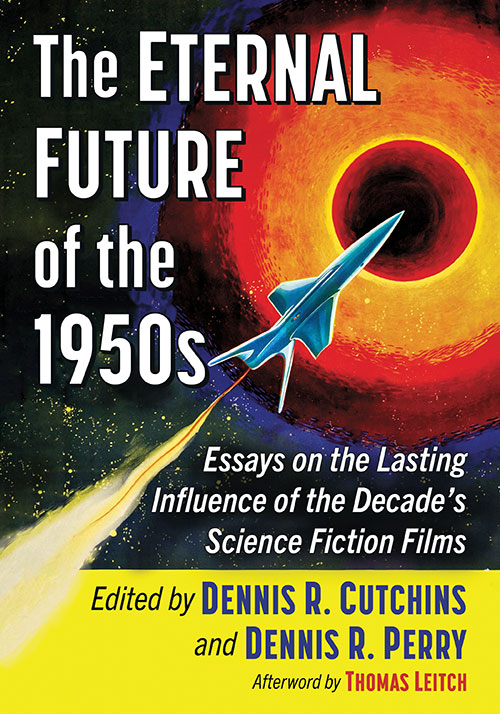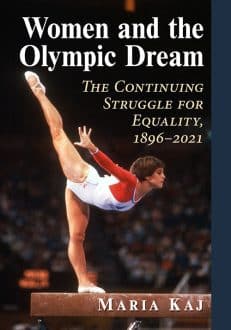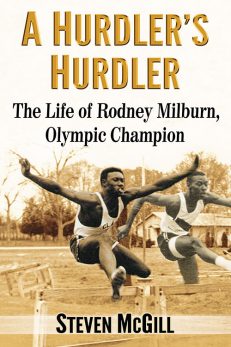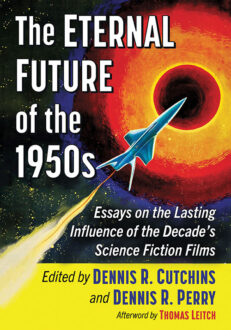The Eternal Future of the 1950s
Essays on the Lasting Influence of the Decade’s Science Fiction Films
$65.00
In stock
About the Book
Science fiction cinema, once relegated to the undervalued “B” movie slot, has become one of the dominant film genres of the 21st century, with Hollywood alone producing more than 400 science fiction films annually. Many of these owe a great deal of their success to the films of one defining decade: the 1950s.
Essays in this book explore how classic ‘50s science fiction films have been recycled, repurposed, and reused in the decades since their release. Tropes from Don Siegel’s Invasion of the Body Snatchers (1956), for instance, have found surprising new life in Netflix’s wildly popular Stranger Things. Interstellar (2014) and Arrival (2016) have clear, though indirect roots in the iconic 1950s science fictions films Rocketship X-M (1950) and The Day the Earth Stood Still (1951), and The Shape of Water (2017) openly recalls and reworks the major premises of The Creature From the Black Lagoon (1954). Essays also cover 1950’s sci-fi influences on video game franchises like Fallout, Bioshock and Wolfenstein.
About the Author(s)
Bibliographic Details
Edited by Dennis R. Cutchins and Dennis R. Perry
Afterword by Thomas Leitch
Format: softcover (7 x 10)
Pages: 311
Bibliographic Info: 41 photos, afterword, filmographies, notes, bibliography, index
Copyright Date: 2023
pISBN: 978-1-4766-8785-8
eISBN: 978-1-4766-4927-6
Imprint: McFarland
Table of Contents
Introduction: The Past and Present Future
Dennis R. Cutchins and Dennis R. Perry 1
Part I: Adapting a 1950s Science Fiction Aesthetic
Presenting Frank Darabont’s The Mist (2007) in Glorious Black & White: The Remaking of a 1950s Sci-Fi Aesthetic
Greg Semenza 11
Retro Reboots: Adapting 1950s Science Fiction in Bioshock, Fallout, and Wolfenstein
Daniel Singleton 25
The Truth Is Out There: 1950s Science Fiction, The X-Files, and the Shifting Dynamics of National Anxiety
Jessica Metzler 43
Part II: Monsters Within and Without
Extinction Panic: Prehistoric Creatures of the Anthropocene
Zak Bronson 61
“Forget the world and hang on to the people you care about the most”: Giant Monster Movies from the 1950s and Their Twenty-First-Century Counterparts
Robin Jeremy Land 75
“Something’s lost in the translation!” Hemimetabolic Adaptation (or Incomplete Metamorphosis) in David Cronenberg’s The Fly
Richard Berger 95
Adapting the Monstrous Other: del Toro Re-Shapes Creature from the Black Lagoon
Glenn Jellenik 110
Part III: Alien Invasions
The Day the Earth Stood Still, The Thing from Another World, and the Creation of Two Archetypes
Dennis R. Cutchins 127
Queer Anxieties and Perverse Desires in the Alien Infiltration Film
Mica A. Hilson 148
The War of the Worlds: Masculine Heroism and Symbolic Spaces in Invasion Narratives
Joan Ormrod 162
The Space Children and the Alien: Magic and Paranoia at World’s End
Dennis R. Perry 182
The Alien in the Graveyard: Extraterrestrial Reanimation in Ed Wood’s Plan 9 from Outer Space and Walter Mosley’s The Wave
Paul Piatkowski 195
Double Trouble: Martin Guerre, Invaders from Mars, and the Body Snatchers Films
Sam Umland 210
Part IV: Other Worlds and Dystopian Visions
Escaping Earth: The Uninhabitable Home in Rocketship X-M, Interstellar, and Ad Astra
Christopher Love 223
From the Promise of the 1950s to the Uncertainty of the 1960s: The Surety of Forbidden Planet Against the Empty Center of Solaris
Robert Mayer 237
New Maps of Hell: Racebending and Fahrenheit 451
William Hart 251
Still Captive? The Maternal Body in 1950s Science Fiction Disaster Films and Mad Max: Fury Road
Rebecca Johinke 267
Afterword: Yesterday’s Tomorrows: The Double Consciousness of Science Fiction
Thomas Leitch 285
About the Contributors 297
Index 299
Book Reviews & Awards
• “Consistently engaging, this volume’s essays make a thoughtful and important contribution. I’m delighted with the focus and range of material and perspectives and am excited to see this work take its place in the body of scholarship on 1950s science fiction films.”—Dr. Cynthia J. Miller, senior faculty, Emerson College
• “Unique, fascinating and well-written…helpful to other scholars of sci-fi yet at the same time accessible to general readers.”—Dr. Aeon J. Skoble, Bartlett Chair in Free Speech and Expression, Bridgewater State University
• “Careful research went into each essay”— Boyce McClain’s Consumers’ & Collectors’ Corner





